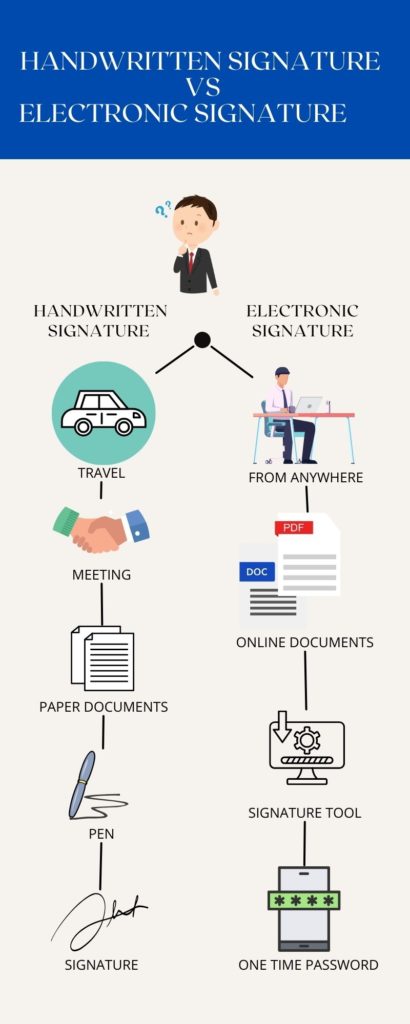In an era dominated by digitalisation, the electronic signature has emerged as a crucial element. The COVID-19 pandemic accelerated its significance, putting it in the spotlight as an essential tool when physical meetings were restricted.
The post-pandemic era has solidified the significance of electronic signatures, and their benefits such as, time-savings, cost efficiency and positive environmental impacts, are widely recognized. Today, these signatures are a crucial asset for both individuals and businesses.
Nevertheless, electronic signatures are still a challenging topic for many people, leaving them with several questions unanswered: What do we mean by electronic signatures? Who are they intended for? What advantages do they offer? How do they work?
What do electronic signatures mean?

Electronic signatures are a digital form of signature that use encryption systems to ensure the reliability, security, and legality of a document, providing a similar value to that of a handwritten signature.
They can be used for various applications such as contracts, business agreements, or attestations. Thanks to the integral information security features they incorporate, electronic signatures ensure that documents exchanged in online operations have not been altered and that the identity of the signer has been verified. Thus, the most notable difference with the handwritten signature is that, unlike the latter, no physical exchange is required.
Electronic signatures, yes… but for whom?
Electronic signatures serve as a practical and efficient tool, streamlining document signing processes. Their utility extends across a broad spectrum of users’ needs, from individuals to professionals needs.
Nowadays, with the rise of digital processes, electronic signatures align with the overall trend of digitalisation. This enables professionals and individuals to adapt to the swift transition to the digital era, allowing them to reap the benefits of electronic signatures over cumbersome physical counterparts.
What are the advantages?
Electronic signatures simplify and accelerate the document signing process significantly. They eliminate geographical barriers and the postal delivery time associated with traditional signatures. This method enables automated processing of signed documents, thus significantly reducing costs and time.
In addition to operational efficiency, electronic signatures contribute to improving the environmental footprint by reducing paper consumption and CO2 emissions linked to traditional handwritten signatures. Their adoption induces a significant step towards modern and environmentally responsible document management.
Besides providing the same benefits of postal signatures such as signature date verification, electronic signatures offer significantly enhanced security compared to traditional ones. This includes, but not limited to, validating the identity of the person and ensuring the integrity of the document content, especially in remote signing scenarios where physical identity verification is not feasible.
How do electronic signatures work?
They are not a trivial scan of your handwritten signature; they involve a technical process that authenticates signatories’ identities, confirms the intent to sign (the signer must provide its content to create the signature) and ensures document integrity (no change can be made in the document without detection).

Electronic signatures can achieve this integrity by using secure and tamper-proof codes to link a digital code to an electronic document. When a person electronically signs a document, a unique digital fingerprint (also known as a ‘hash’) is generated for that document. This fingerprint is then linked to the electronic document using a unique mathematical link (a private key) of the person signing the document. The use of this private key is the proof of the user’s intention to commit to the document’s content.
While the underlying mathematical concepts are complex, their implementation remains hidden from the user, ensuring that the use of electronic signatures is easy and accessible to everyone while carrying advanced security features.
Our offering at Nowina Solutions
At Nowina Solutions, we provide user-friendly electronic signature software for online signing and validation. This solution requires nothing more than:
- A web browser;
- A digital device for signing and authenticating documents (such as a mobile phone, a smart card, or a token);
- The creation of an account on EVA, our signing platform.
EVA allows you to electronically sign various documents whilst adhering to the latest standards of the European Telecommunications Standards Institute (ETSI – the body in charge of the standardisation of electronic signatures in Europe).
Our team is ready to assist you in your digitisation journey. Feel free to contact us at +35226102053 or via email at info@nowina.lu

